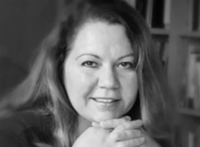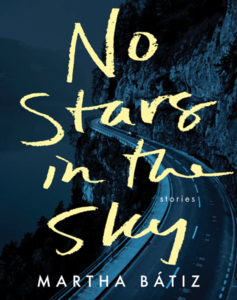"They are Warriors, They Bear Witness" September Writer in Residence Martha Bátiz on the Women Who Fill Her New Story Collection
The stories in Martha Bátiz's No Stars in the Sky (House of Anansi Press) are painfully, urgently timely, exploring the objectification and oppression women experience as their rights, bodies, and choices are battled over by the powerful.
Bátiz creates 19 separate universes in the collection, pulling no punches as she depicts waves of joy, pain, loss, and resilience in the lives of her characters. She draws on her Mexican roots to craft jewel-like stories of Latin American women standing up to repression both political and personal, as well as setting many stories closer to her current home in Toronto.
The issues close to her heart are explored in deft, moving narratives that touch on migrant children at the southern U.S. border, the disappeared women of central and south America, and the intersection of race and gender in power structures and survival. Tragic, operatic, gutsy, and tough, her stories shine with hope amidst injustice.
We're incredibly excited to announce that Martha is joining Open Book for the month of September as our writer in residence. We're speaking with her today about No Stars in the Sky and how she balances work, family, and writing. She tells us how the characters' plights in the stories are linked by the "urgent injustices that keep [her] up at night", how her editor plucked the perfect title from a line in one of the stories, and why it is important to celebrate writing milestones along the journey and not just at publication.
Stay tuned to the writer in residence page throughout September to hear from a talented, urgent, and powerful writer. You can check out her first post already to hear from Martha about the role poetry plays in her life as a prose writer and more.
Open Book:
What do the stories have in common? Do you see a link between them, either structurally or thematically?
Martha Bátiz:
The stories in No Stars in the Sky have several things in common. The protagonists are all women who are facing life-changing moments, be it loss, hardship, oppression. They are survivors, they are warriors, they bear witness. They are on a journey, be it physical or emotional. What links these stories is my desire to point towards those urgent injustices that keep me up at night (the situation of migrants in the Mexico-US border, for instance, and misogyny, and patriarchal oppression in general).
OB:
How did you decide which story would be the title story of your collection? Why that story in particular?
MB:
No Stars in the Sky received its title not for a story but from a single line that can be found in “Apartment 91B.” The character is staring at the desert and says “there are no stars in the sky,” and my wonderful editor at Anansi, Douglas Richmond, thought that would be a suitable title for the collection because most stories are dark. This is also reflected in the book’s cover. I couldn’t agree more or be happier with the result.
OB:
What do you enjoy most about writing short fiction? What is the toughest part?
Your CanLit News
Subscribe to Open Book’s newsletter to get local book events, literary content, writing tips, and more in your inbox
MB:
What I enjoy most about writing short fiction is that I can have a full draft ready in one sitting. I only sit down to write a short-story once its main character and some of the key aspects of the plot have been fermenting in my mind long enough that I feel the basic ingredients are ripe for me to work with, so to say. Then I sit down at the computer once everyone at home has gone to bed (because I don’t want to risk having distractions), and I write for as long as the story requires. Sometimes I write from ten at night until six in the morning, have breakfast with my kids, and then catch up on my sleep for a couple of hours (I used to do that a lot when I was younger, now I find it’s getting increasingly harder to cope with the kind of exhaustion such a choice can cause). But I love having a full first take of the story already out there, on paper (which is to say, on the computer screen) waiting for me to come back and put it into shape. The toughest part is, for me, finding the time to work without interruptions, because as a part-time university lecturer and a mother of three, real life is constantly raining on me with its never-ending demands. So I have to get tough and put time aside for my writing and it’s not always possible to do this as often as I’d like. When I am writing, however, or editing, I can spend hours on it and not even realize that I haven’t eaten or even had any water. I get completely absorbed by it. That is my favourite part: knowing that I can dive into those worlds that inhabit my mind and fully escape the one that surrounds me, at least for a few hours every now and then. My dream would be to do it every day but, alas, bills need to be paid and children need their mother. And that’s okay, too, because I enjoy teaching and, of course, I adore my twin daughters and my son.
OB:
Did you do any specific research for any of your stories? Tell us a bit about that process.
MB:
Yes, I always do research (it’s inevitable after one has completed a PhD – sigh). For No Stars in the Sky, I researched Pablo Neruda’s personal life in order to craft the story called “Kamp Westerbork.” I researched a key moment in the history of Tsarist Russia for “Svetlana of Montreal.” And I listened to very painful audios and read harrowing testimonies in order to be able to write “The Other Side.” I used what I learned during my own doctoral research to inform “The General’s Daughter” and “Apartment 91B”, and because I am a news junkie, “Broken” is deeply linked to the tragedy of the women who are killed or disappeared nowadays in Mexico. “Helen’s Truth” and “Rear-View Mirror” make allusions to Greek Mythology, which I devoured as a teenager and which is constantly coming back to my mind as I learn more and more about the human experience. Of course, it is one thing to have the knowledge (especially in an academic setting), and an entirely different one to use it in order to build a fictional character who lives in a world like ours. I try to put myself in the characters’ shoes, and to see the world the way they would. I try to be compassionate but not in the sense of feeling sorry for them, but feeling sad, or outraged, or angry with them. And that takes a lot of thought, of care (I don’t want to ever be disrespectful towards those who have lived through these tragedies, much less to those who lost their lives), and insight. It’s not easy and it’s not quick. It’s a process that enriches and changes my perspective every single time.
OB:
What was the strangest or most memorable moment or experience during the writing process for you?
MB:
There were many, it’s hard to pick only one. For No Stars in the Sky, I was able to work more closely on a story titled “The First Piano,” which is inspired by my mother, Eva María Zuk, who was a concert pianist and offered the first recital to ever take place at this tiny town in the Sierra of Hidalgo, in Mexico. I had written the first draft when she was alive, and she even curated the character’s musical program for me, but she died before I finished writing it. This is a story I rescued, so to speak, to work on it more closely, make it more current, and pay homage to her, and it was a beautiful experience to do that and have the story published five years after her passing. I know she would have been proud to see it —to see this book in general. She was always very supportive of my writing. I also had an opportunity, in this book, to pay homage to a very tragic but amazing love story which is narrated in “Bear Hug.” I don’t want to give out any spoilers, but it was a great pleasure, and an honour, to be allowed to tell this tale.
OB:
Do you have a favourite short story collection that you've read? Tell us why it is special to you.
MB:
I have several favourite short story collections that I’ve read. I love reading short fiction. Fires, by Marguerite Yourcenar, is one of my all-time favourites. “Helen’s Truth,” the last story in No Stars in the Sky, is my own personal answer, or continuation, if you will, to “Clytemnestra or the Crime.” I read a lot of short fiction in Spanish as well. I am a huge fan of María Fernanda Ampuero (everyone should read Cockfight, it’s brilliant), Samantha Schwebling, Valeria Correa Fiz, there are so many talented women writing in Spanish right now, I wish they were all translated into English. In this language, “Dimension,” by Alice Munro, “The Shawl,” by Cynthia Ozick, “So, What Are You, Anyway,” by Lawrence Hill, “The Lottery,” by Shirley Jackson, and “Heat,” by Joyce Carol Oates, are some of my all-time favourites. These stories are special to me because I have truly been transfixed by their protagonists, by the plot, by the language. They have left me breathless. I love it when literature does that to me.
OB:
Did you celebrate finishing your final draft or any other milestones during the writing process? If so, how?
MB:
Do I celebrate finishing my final draft or any other milestones during the writing process? I’m Mexican: I celebrate everything! Everything is a good excuse for a party!
All joking aside, I think it is important to acknowledge the amount of work that we put into what we do, because it is never seen by our readers, but those around us not only see it but sometimes suffer because of it. All the hours typing away at the computer instead of spending time with my children and husband weigh heavily on me, but once the final draft is ready, or once the book has gone to print, I enjoy sharing those accomplishments and thank my loved ones for their support. Writing is a lonely craft and I am a very gregarious person by nature, so I don’t think I would do well at all if I didn’t have my family and friends by my side. I like to open a bottle of wine and relax after what has been, usually, a stressful and exhausting period of countless nights in front of the computer screen.
_______________________________________________________
Martha Bátiz is an award-winning writer, translator, and professor of Spanish language in literature. She is the author of four books, including the story collection Plaza Requiem, winner of an International Latino Book Award, and the novella The Wolf’s Mouth, winner of the Casa de Teatro Prize. The short story collection No Stars in the Sky is her newest book. Born and raised in Mexico City, she lives in Toronto.





